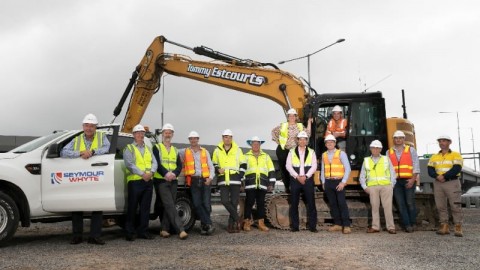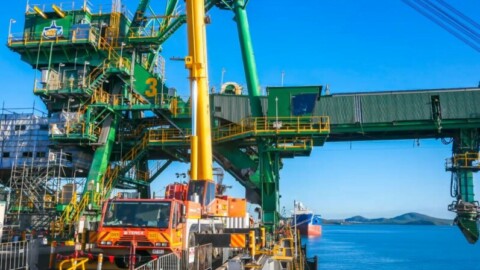Ports around Australia are implementing measures to ensure Australia and its maritime industry do not fall victim to an epidemic of novel coronavirus.
While authorities report the threat of the coronavirus to Australian border workers remains low, ports nationwide are putting measures in place to minimise risk. First and foremost, they have released information designed for port tenants, facility operators, shipping agents and any other organisation that interfaces with vessels in their waters.
What is a coronavirus?
Coronaviruses are a type of virus that can affect humans and animals. Some coronaviruses cause illness similar to the common cold while other coronaviruses cause more serious illness, such as severe acute respiratory syndrome (SARS) and Middle East respiratory syndrome (MERS).
The novel coronavirus (2019-nCoV) is primarily affecting people who have recently been in the city of Wuhan, China, or had contact with sick people from Wuhan.
Symptoms of coronavirus include fever, cough, sore throat and difficulty breathing. Difficulty breathing is a sign of possible pneumonia that requires prompt medical attention.
The Australian Department of Health has advised that the risk to workers at the Australian border is considered relatively low.
While the Federal Government remains vigilant, it has advised that it is more likely that passengers and crew displaying infectious symptoms have a common respiratory infection such as influenza, rather than coronavirus.
The latest fact-sheet for the maritime industry produced by the Department of Health can be found here.
Ports Australia utilising members to facilitate dialogue
Peak industry body, Ports Australia, has been at the forefront of the conversation since the first concern was raised. It is working to facilitate dialogue between industry and department to ensure the safety of maritime staff around the country.
A spokesperson for Ports Australia said the coronavirus situation has proven how valuable the diversity of its members’ industry knowledge is. With a threat of national concern, the organisation sought to pull out every stop and apply every resource that could assist in the collective effort.
Ports Australia utilised the practical knowledge held by the Chair of its Port Operations working group, John Finch. His years of experience at Pilbara Ports and willingness to share his operational knowledge was worth gold when Ports Australia brought him into conversations between industry and government.
All information from the government was filtered down through Ports Australia’s networks of relevant working groups so those operating in specialist roles at ports could continue their duties with the necessary measures in place.
For one of the first times since their signing, the working groups were able to share knowledge across the region with our Pacific port members and learn from the measures they were taking.
Ports Australia CEO, Mike Gallacher, thanked all involved for their contribution but reminded that the effort isn’t over.
“There will always be a balancing act in these scenarios with the port sector to maintain the flow of the supply-chain which our nation would stop without. However, that doesn’t come without the focus of protecting our maritime workers, as well as Australia’s borders from threats like the coronavirus,” Mr Gallacher said.
“The concern of the coronavirus does not undermine our ports’ constant focus on biosecurity but reinforces it, affirming how essential it is for an island nation which relies on trade and tourism.
“It’s vital we remember that while the industry should be proud of their persistent efforts over the last few weeks, vigilance will be key to keep operations running safely and smoothly.
“The coronavirus has shown our industry’s resilience and understanding of urgent action needed to protect our borders, workers, and nation.”
Ports around Australia respond to the threat
Maritime Safety Queensland (MSQ) has announced its approach to managing incoming vessels to Queensland, aligning with other states.
Effective from 12pm Thursday 6 February 2020, ships must not enter a Queensland pilotage area until 14 days have elapsed since the ship’s departure from mainland China.
This direction applies to the masters of all ships in Queensland waters if:
- The ship left, or transited through mainland China on or after 1 February 2020
- The ship intends to enter a Queensland pilotage area
The immediate threat of coronavirus via Queensland Ports is considered relatively low based on this known incubation period of the virus and the time vessels spend at sea before they arrive in Australian waters. However, the safety and well-being of maritime industry personnel, will continue to be of paramount priority.
This new precaution is expected to have negligible effect on coal carriers docking at Gladstone Ports Corporation’s (GPC) RG Tanna Coal Terminal, with travel and queue time from mainland China to Gladstone entry being in the vicinity of 14 days.
However, LNG ships, which have a shorter travel time from mainland China to Gladstone, may need to adjust their plans.
GPC continues to monitor the situation and are in continuous liaison with State and Federal agencies, including chief medical officers and Australian Border Force. GPC will also continue to maintain their precautionary crisis management activation until further notice.
Mid West Ports Authority (MWPA) takes this risk and its potential impacts on staff, stakeholders and the Mid West community very seriously.
In addition to the Department of Agriculture (Biosecurity) measures and actions, MWPA is actively vetting people arriving into the port, screening those who have travelled through, or from high risk regions i.e. mainland China, and enforcing a 14 day incubation period with no crew or passengers disembarking from ships during this time.
TasPorts has made the decision to implement a number of extra precautionary measures:
- All vessels must supply information to TasPorts relating to the health of their crew and passengers and continuously monitored them for signs of illness
- Crew that have originated or transited through China are required to remain onboard the vessel when in port
TasPorts has supplied stocks of masks, glasses, gloves, personal hand sanitiser and sanitising wet wipes to operational staff.
Whilst the risk of contraction of the virus is low and border protection agencies have a number of robust processing arrangements for these vessels when in port, those companies who have staff that may be required to go onboard these vessels and/or work closely with crew from these vessels may wish to consider providing the same precautionary measures to their employees.

















